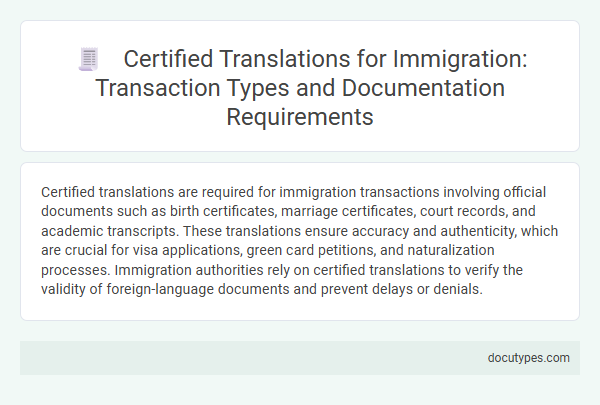Certified translations are required for immigration transactions involving official documents such as birth certificates, marriage certificates, court records, and academic transcripts. These translations ensure accuracy and authenticity, which are crucial for visa applications, green card petitions, and naturalization processes. Immigration authorities rely on certified translations to verify the validity of foreign-language documents and prevent delays or denials.
Understanding Certified Translations in Immigration Processes
Certified translations play a crucial role in immigration processes by ensuring that non-English documents are accurately understood by authorities. These translations provide official validation that the content is true to the original document, maintaining legal integrity.
Understanding which transactions require certified translations helps applicants avoid delays and legal complications during immigration proceedings.
- Visa Applications - Certified translations are required for submitting foreign-language birth certificates, marriage licenses, or academic transcripts during visa processing.
- Asylum and Refugee Claims - Official translations of personal statements, legal documents, and country conditions reports are necessary to support these applications.
- Naturalization Papers - Documents like foreign criminal records or civil documents must be translated and certified to complete the citizenship application accurately.
Common Immigration Transactions Requiring Certified Translations
Certified translations are essential for various immigration transactions to ensure accuracy and compliance with legal standards. Common immigration documents such as birth certificates, marriage certificates, and court records typically require certified translations.
Visa applications and green card petitions also demand certified translations of supporting documents like police clearances, academic transcripts, and employment records. You must provide certified translations to avoid delays and ensure your immigration process proceeds smoothly.
Essential Documents Needing Certified Translation for Immigration
| Type of Document | Reason for Certified Translation |
|---|---|
| Birth Certificates | Proof of identity and familial relationships requires accurate translation to verify personal details. |
| Marriage Certificates | Verification of marital status essential for spousal visas and family-based immigration petitions. |
| Divorce Decrees | Legal proof of marital dissolution necessary for adjusting status or applying for certain visas. |
| Criminal Records | Background check documents must be precisely translated to avoid delays in the immigration process. |
| Academic Diplomas and Transcripts | Certification of educational qualifications supports employment-based visa applications and credential evaluation. |
| Medical Records and Reports | Health-related documents are critical for meeting immigration health requirements and assessments. |
| Financial Documents | Proof of funds, income statements, and tax returns need certified translation to verify financial stability. |
| Death Certificates | Required to confirm legal status of deceased family members in certain immigration cases. |
| Police Clearance Certificates | Crucial for background screening and establishing good moral character. |
| Legal Agreements and Court Orders | Documents outlining custody, guardianship, or legal disputes require certification to ensure legality. |
If you are submitting immigration documents, the certified translation of these essential records ensures that immigration authorities accurately understand the content, preventing delays or denials in your application process.
Who Can Provide Certified Translations for Immigration?
Certified translations are essential for various immigration transactions to ensure accuracy and legal compliance. Certain documents must be translated by authorized professionals to be accepted by immigration authorities.
- Official records - Birth certificates, marriage certificates, and court documents require certified translations for processing.
- Legal documents - Affidavits, contracts, and immigration forms must be translated by individuals with certified credentials.
- Who can provide certified translations - Certified translators accredited by recognized translation associations or sworn translators authorized by government agencies can perform these translations.
Your immigration application success depends on using certified translations from qualified providers to meet legal standards.
Legal Standards and Certification Requirements for Translation
What types of transactions require certified translations in immigration processes? Certified translations are essential for legal documents such as birth certificates, marriage certificates, court records, and immigration forms. These translations must meet strict certification standards to ensure accuracy and authenticity for legal review.
Why are legal standards important for certified translations in immigration? Legal standards guarantee that translations are precise and reliable, which helps prevent delays or rejections of immigration applications. Your translated documents must include a signed statement from the translator affirming completeness and accuracy.
Step-by-Step Process for Submitting Certified Translations
Certified translations are required for various immigration documents, including birth certificates, marriage certificates, court records, and diplomas. These translations ensure that your documents are accurately understood by immigration authorities.
Begin the submission process by selecting a qualified translator who provides a certification statement. Next, include the certified translation alongside the original document when submitting your immigration application or petition.
Tips for Ensuring Accuracy in Immigration Document Translation
Certified translations are mandatory for immigration documents such as birth certificates, marriage certificates, court records, and educational transcripts. Immigration authorities require these translations to verify the authenticity and accuracy of submitted documents.
Ensuring accuracy in immigration document translation involves hiring professional translators with expertise in legal and immigration terminology. It's essential to provide clear, legible original documents and review translated content carefully. Using certified translation services minimizes the risk of delays or rejections in the immigration process.
Frequently Asked Questions About Certified Translations
Certified translations are essential for immigration processes involving official documents such as birth certificates, marriage certificates, and court records. Visa applications, green card petitions, and asylum requests often require these translations to ensure accuracy and authenticity. You must provide certified translations when submitting any legal or governmental documentation not originally in English.
Consequences of Improper or Non-Certified Document Translation
Certified translations are required for critical immigration documents such as birth certificates, marriage certificates, court records, and legal affidavits. Improper or non-certified translations can lead to delays, application denials, or even legal complications affecting your immigration status. Ensuring accurate certified translations helps maintain the integrity of your submission and supports a smoother immigration process.
What Types of Transactions Require Certified Translations in Immigration Processes? Infographic

